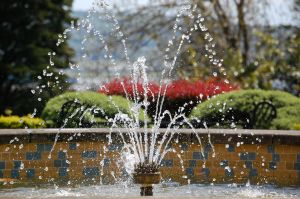
by jphilo | Nov 2, 2012 | Church Newsletter Columns

But you can’t be serious!
You can’t condone evil!
So why don’t you do something about this?
Why are you silent now?
This outrage! Evil men swallow up the righteous
and you stand around and watch!
Habakkuk 1:13
The boxes in our attic are ordinary enough. A mix of old, dusty cardboard boxes and plastic tubs. Some of them house my journals, years and years worth of innocuous spiral notebooks and speckled composition books filled with my deepest thoughts and prayers. No one but me has ever read them. That’s a relief because they also contain plenty of edgy questions for God, too.
Raw questions about why he allowed our newborn baby to suffer. Hard questions about why good people are punished for doing what is right. Uncensored questions about why God doesn’t stop airplanes from flying into skyscrapers. Not stuff I want other people to see. Except perhaps our kids once I’m gone, so they can see the real me–a woman filled with more doubts than faith when exposed to the grimy, gritty side of life.
A quick read through Habakkuk makes me wonder if the prophet intended for anyone to read what what he wrote after his vision of the invasion of Judah.
- God, how long do I have to cry out for help before you listen?
- How many times do I have to yell, “Help! Murder! Police!” before you come to the rescue?
- Why do you force me to look at evil, stare trouble in the face day after day?
- So why don’t you do something about this?
- Why are you silent now?
Would Habakkuk have written down these questions if he’d known his words would be read for several millenniums? Or would he have toned things down a bit?
I don’t know. But this I do know. We can be thankful Habakkuk recorded his questions, undiluted and uncensored. We can be more thankful that God saw fit to make Habakkuk’s raw, pain-filled words part of his holy Word. Because their presence in the canon of Scripture means our God welcomes our questions when life gets grimy and gritty.
In the rest of Habakkuk, God shows that he is big enough to handle our hard questions. Furthermore, he demonstrates that when we ask hard questions, he will give answers. Not always as quickly as we’d like. And not always the answer we want. Instead, he consistently gives the answers we need when we need them. And by his sovereign wisdom and power, he uses those unexpected, untimely, and sometimes unwanted answers to fill our hearts with more faith than doubt and to shape us into the real people he created us to be.

by jphilo | Oct 1, 2012 | Church Newsletter Columns

The Lord is not slow to fulfill his promise as some count slowness,
but is patient toward you, not wishing that any should perish,
but that all should reach repentance.
2 Peter 3:
I almost didn’t plant any lobelia last spring. The fussy flower doesn’t like heat and drought, and I don’t like namby-pamby plants that require extra watering and attention. But after the drab of winter, the perky purple blossoms were a bright spot of color in the local greenhouse last April, and I caved.
I planted the lobelia in an old washpan, plopped the last remaining geranium in with it, and set the pot beside the old pump in the yard. The picturesque tableau did quite nicely until the hottest, driest summer since 1988 arrived. The lobelia fried, but the geranium struggled on valiantly. So valiantly that I finally took pity on the thing and moved the washpan closer to the house where the plant could enjoy shade for part of the day.
The geranium rallied, but the lobelia looked dead. Dead enough that I almost pulled it up.
But for some reason I couldn’t make myself do it. Eventually, the weather cooled down, and tiny seedlings began poking through the crispy remains of the lobelia. More sprouted in the soil around the now thriving geranium.
“I should put the geranium in another pot and dump the dirt from the pan before those weeds produce seeds,” I told myself more than once. But something kept me from acting on the impulse. And one cool, late summer morning, I stepped outside and and was greeted by perky purple blossoms waving from the washpan. A new crop of lobelia was blooming. I was inordinately pleased.
During my quiet time the other day, 2 Peter 3:9 was quoted as the prayer of confession in our church’s monthly prayer guide. That morning, I prayed through the verse and repented of the same sins I struggle with day after day. Then I thanked God for his slow work in my life. For his patience when I wander away from his living water into spiritual drought. For looking beyond the sins that shrivel my spirit and seeing my heart for him instead. For nurturing the seeds he’s planted inside me. For encouraging new and vibrant life that will burst forth in his right time. For never giving up on me or any of his children as long as we have life and breath. For being inordinately pleased when we seek him, repent, and complete the purposes he created us to fulfill.
Then I wrote a note on next April’s calendar in my planner: Buy lobelia. It looks dead in the heat of the summer, but it comes back.

by jphilo | Aug 31, 2012 | Church Newsletter Columns

Then when he (Barnabas) had come and witnessed the grace of God,
he rejoiced and began to encourage them all
with resolute heart to remain true to the Lord.
Acts 11: 23
I’ve always been a little starry-eyed about the billing Barnabas gets in the Bible. Why not when his name means Son of Encouragement? Compared to James and John, known as the Sons of Thunder and Rahab, who is remembered as the Harlot, even though she quit that job and began a new life, Barnabas nabbed one sweet name.
Even better, he lived up to his moniker. In Acts 9:27, Barnabas sticks up for Paul, the new boy in town with a bad rep. In Acts 11:23, Barnabas travels to Antioch to encourage the new converts. Those accounts make me go all starry-eyed, and I wanna be just like Mr. Encouragement when I grow up.
But further reading of the adventures of Barnabas, usually in the company of Paul, can take the twinkle out of my starry eyes. Like when the dynamic duo visited the synagogue in Salamis, and “the rulers sent a message to them, saying, ‘Brothers, if you have any word of encouragement for the people, say it.’” (Acts 13:15) Then Paul, not always the soul of tact, encouraged them by relating the history of God’s mercy toward his stiff-necked and rebellious covenant children, also known as the Jews, and the fulfillment of his covenant through the life, death, and resurrection of his Son, Jesus Christ.
How did the audience respond to the encouraging words Paul spoke and Barnabas seconded? At first, the leaders asked them to speak again and invited the entire town, Gentiles and Jews, to come for a dose of encouragement. At that second gig, Acts 13:48 says the Gentiles “began rejoicing and glorifying the word of the Lord; and as many as had been appointed to eternal life believed.” The Jews, on the other hand, incited a riot and drove Paul and Barnabas out of town.
Their reaction seemed a little drastic toward two guys trying to spread sunshine and good cheer. Until I compared my New American Standard (NAS) translation to the English Standard Version (ESV). The word encouragement in NAS is translated as exhortation in ESV. And exhortation means speaking and teaching the truth. Which means biblical encouragement is not always a rah-rah, feel good experience since speaking and teaching truth often exposes sin. Which leads to conviction. Which leads to repentance. Which requires change. And change is hard.
No wonder the Jews rioted. But by the power of the Holy Spirit working through the words of Paul and the presence of Barnabas, the hearts of many Gentiles were encouraged/exhorted to repent and believe the truth. And they were changed for eternity.
God used ordinary guys like Barnabas and Paul to speak and teach gospel truth, and he still uses ordinary men and women like you and me today. Sometimes, our words may cause a riot. But other times, the gospel will lead those imprisoned by discouragement and deceit to new life in Christ and the promise of eternal life. If that thought doesn’t put a starry twinkle back in my eyes and yours, what will?

by jphilo | Aug 3, 2012 | Church Newsletter Columns

O God, Thou art my God; I shall seek Thee earnestly;
My soul thirsts for Thee, my flesh yearns for Thee,
In a dry and weary land where there is no water.
Psalm 63:1
The drought of 2012 is a doozy, no doubt about it. The hot, dry weather has our family reminiscing about other droughts we’ve endured. Mom remembers how hot their old farmhouse near Pipestone, Minnesota was during the summer of 1936. “The upstairs was so hot,” she says, “we dragged our blankets and pillows outside to sleep in the yard.” Then she adds, “The next drought came in 1956. The summer I was pregnant with you.” She nods in my direction. “I was miserable until you put in an appearance in July.”
I pretty much know how miserable Mom was because our daughter Anne was also born in late July during the drought of 1988. Anne, of course, doesn’t remember that toasty, dry summer but our son Allen, who was six that year, does. “The grass was brown and crispy,” he says, “and the yellow jackets built hives in the cracks in the ground.”
And now Allen’s wife knows how miserable Mom and I were during the droughts of ’56 and ’88. Only more so because she’s pregnant during the worst drought since ’36 and isn’t due until September. Please, keep her in your prayers!
Our family tradition of anticipating new life during drought years has warped my perception of them. When reading biblical accounts of droughts, or when listening to current weather reports I see circumstances, both past and present, as pregnant with opportunity. God used ancient droughts to bring his wandering people back to him. Men and women who trusted him in times of need became part of the Christ’s lineage. Over and over, God blessed bone-dry believers with the promise of a future Messiah, and the faithful clung to that hope.
This rain-starved summer, as every other drought year in my lifetime and yours, is an opportunity for us to cling to faith as our spiritual forefathers did. We can pray for people to turn to God as their illusion of human control evaporates in a cloudless sky. We can trust God to prove himself faithful in the midst of spiritual and physical want. We can share Christ’s living water with lost and parched wanderers and expect God to bring forth new life in many.
When we trust God in lean times, we are like the psalmist David, who sought God earnestly in the desert. Like David, we look beyond the burned fields and wilting trees and see God in his sanctuary, watering our souls with his completed promises and grace. We learn to be satisfied in him as we’ve never been satisfied before. When we gaze upon the God who waters our lives through the saving grace of a baby in a manger, our Father assures us that his fountain of life never runs dry.

by jphilo | Jul 2, 2012 | Church Newsletter Columns

Everyone who comes to me and hears my words and does them,
I will show you what he is like:
he is like a man building a house,
who dug deep and laid the foundation on the rock.
Luke 6:47-48
A few days ago, Hiram and I made a quick, midweek trip to Wisconsin to see our son and his wife. The weather was gorgeous, so while the young folk were at work, we explored winding country roads we usually passed by in a hurry. Finally, we had time to investigate the “scenic overlook” mentioned on cryptic road signs ignored during other visits. We parked the car and followed the path, expecting to see a lovely valley complete with a sparkling river, and perhaps one of the large mounds scattered throughout southwest Wisconsin.
Instead, in the distance we could see the famous House on the Rock clinging to the side of a limestone cliff. While I snapped several photos of this feat of engineering, something my dad used to say came to mind. It’s a nice place to visit, but I wouldn’t want to live there.
We hiked back to the car and the the sight-seeing road again. But I kept thinking about the House on the Rock as a metaphor for our lives since Hiram left work early because of back pain in late May. One day he was training for a half- marathon. The next day, the pain was so bad, he couldn’t walk. He spent two weeks in bed. He followed the doctor’s orders and waited for the pain to ease. It didn’t get better, so it was back to the doctor for tests, more waiting for results, then a diagnosis, a referral to a neurosurgeon, and finally successful back surgery.
In the weeks leading up to the diagnosis and surgery, we prayed a lot. We talked a lot. We sat on the edge of our own persona cliff, peering into the unknown and asking God plenty of questions:
Why are you doing this, God?
Will Hiram have to live with this pain the rest of his life?
Will he be able to work again?
Be physically active again?
Should I look for a teaching job?
How will You bring good out of our family’s pain and sickness and unwanted change?
The night before surgery, Hiram said, “I’m ready for whatever the outcome is. Whatever happens, it will be good.”
When he said those words, we didn’t know the surgery would be successful. We were still sitting on the edge of the cliff. We were still peering into the unknown. But in those weeks of uncertainty we learned to cling to the promises and goodness of God. The more we did, the more the Rock beneath our precariously placed feet stood firm.
Immovable.
Unchanging.
Ever present.
Through it all, God impressed upon us a precious truth. Our cliff was not a fun place to visit, but upon the firm foundation of the Rock of Ages was and is the best place to live.

by jphilo | Jun 1, 2012 | Church Newsletter Columns

Therefore, putting aside all filthiness and all that remains of wickedness,
in humility receive the word implanted, which is able to save your souls.
James 1: 21
I am obsessed with geraniums. Not all geraniums. Just the heritage geranium that’s been in our family for four generations. In the 1930s, Mom’s grandma gave a cutting from her favorite geranium to my grandma. My grandma gave Mom a cutting in the 1970s. A few years back, Mom gave one to me.
Once it rooted in a glass of water, I planted it in a pot and pampered it all summer long. When the weather turned cold, I hauled the pot inside and placed it in front of a south window. After at winter’s worth of pampering, I snipped off cuttings in March, rooted them in water, and planted them outside come warm weather. Each year, I repeat the process, and this year, heritage geraniums rule our lawn – in flower beds, hanging pots, and container gardens.
Uh-huh, it’s an obsession. But a magnificent one. Because my geraniums are a living illustration of Jesus’ parable of the vine and the vine dresser. Every fall, when the plants are moved inside, they respond in the same way. The biggest, healthiest leaves turn brown. When I pluck them off, clusters of small, bright green leaves sprout in their place. Every March, when I prune the plants, more leaves sprout from the stumps that remain. A few days after the cuttings are placed in water, their biggest, healthiest leaves turn brown and drop. Inevitably, roots sprout from the joints where leaves once grew. When warm weather comes, and I plant the rooted cuttings outside, the same thing happens. Healthy leaves turn brown. New, abundant growth replaces them. Every fall, when the weather turns cold, more vigorous geraniums get hauled into the house than the year before.
Each season, as the geraniums struggle with new transitions, I reflect upon my resistance to changes in my family, my work, and my spiritual life. Once I adjust to new circumstances, I want things to stay the same. Forever. But God doesn’t work that way. He constantly prunes me and all his children. He plunks us into new environments. He strips away our dead stuff. He initiates new growth in the places we once hurt the most. When we submit to the pruning and watering and planting and transformation of his Holy Spirit, we keep growing. We bear fruit. We multiply.
I never met the great-grandmother who passed on the cutting of the geraniums her descendants still tend. I think of her when the blood red geraniums blossoms unfurl, and I know a piece of her lives inside me.
My eye hasn’t seen the God whose word is implanted in the garden of my heart and watered by the Holy Spirit. But when I contemplate the cross and consider his blood shed for sinners, I know he lives within me. Grounded by his love, I begin to grow.







